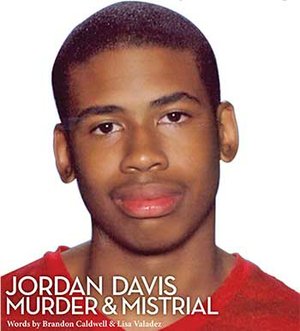2/20/2014

Silence.
As Michael Dunn stood in front of judge and jury awaiting his fate last Saturday afternoon, his face writhed a bit when he heard the echoing sonance of the word “guilty”.
Guilt.
Some may have cheered in that Jacksonville, FL courtroom but the caterwauling outside of it told a much different story. Bitterness, curses, anguishes. “Again,” some muttered. “It happened again.”
Dunn’s verdict, in the wake of the senseless killing of 17-year-old Jordan Davis didn’t really change how people view youths in our country, especially those of a minority complexion. It barely even registered as a puddle in the long river of pain and confusion that is young life extinguished over senseless acts of violence. Instead, the verdict gave somewhat of a “go ahead” on those who ever thought about provoking a black male and then shooting them dead. Sure, that statement may be just a bit over the top but let’s face it, what did the Dunn trial prove? Provoke an unarmed black male into a confrontation, shoot him dead because of fear of life, claim the ‘Stand Your Ground Defense’, and get off on a murder charge all while tarnishing the character of a deceased black teen.
Every recent trial, from that of Trayvon Martin’s killer George Zimmerman to Dunn hasn’t completely zeroed in on the man on trial but rather the deceased. “What about him seemed so threatening?” the defense will argue. “What made him strike so much fear that the defendant had to use deadly force in order to protect himself?”
What Davis’ family got was a void still left as round as unfulfilled as when the case began. A “little bit” of closure in the words of the victim’s mother Lucia McBath but a little may not be enough.
What Davis’ three friends received was something similar. The man who aimed a nine millimeter at them and fired 10 rounds, so unaware of the nature of his actions that he returned to his hotel room, walked his dog, ordered a pizza, was convicted of nearly killing them – they lost as well. Although Dunn was found guilty on charges of attempted murder, Michael Davis’ three friends – Tevin Thompson, Leland Bronson, and Tommy Stornes must carry with them each and everyday the fact that even their testimony wasn’t good enough to help convict the man that senselessly murdered their friend. Those three young men now walk with a rather eerie feeling, that the attempt on their life may mean more to the courts and Florida’s dogged gun laws than the death of their friend in the backseat of that red SUV.
And all it beckons to a simple question that need be answered: why are our minority youth deemed to be so threatening, even when they’re the ones provoked?
“Tell me, what’s a life worth?”
Davis was a student at Samuel W. Wolfson High School, a magnet school in Duval County, FL. That platitude doesn’t completely justify why he was shot after a confrontation but it places more context to this degree – no matter how high our youth scale, the most generic perceptions of them will be what they are judged on. That theory played heavily on the jury, who initially held a 10-2 verdict and eventually deadlocked at 9-3. In an interview with ‘Nightline’ earlier this week, Juror #4 explained why such a decision was made, “[the three holdouts] believed that regardless, Dunn believed he was in danger of great bodily injury or death.” To the jury members who swayed another, as long as Dunn said he felt threatened, regardless of evidence showing no weapon in the SUV– he was justified in shooting ten times.
Provoke confrontation, end confrontation. Win.
The “talk”. It’s a sad reality within Black America– just like the “Stand Your Ground” defense. We’ve heard it over and over again but what exactly is the “talk” and why is it important? For years, parents of minority youth have taught their sons to not travel in packs—it may draw negative attention. Don’t walk too fast because someone might think you did something wrong. However, make sure not to walk too slow because it may seem like you’re looking for trouble. Don’t give someone reason to wrongly perceive your actions especially if you find yourself in in a neighborhood you’re not familiar with. Most importantly, do not ride around with your windows down blasting your music – it may anger others. Unfortunately, for Jordan Davis, this happened. He was with three other young men, the music in the vehicle was playing too loud and it angered someone – Michael Dunn.
The sad reality is that what happened to Martin, Davis and other teens across the county is that it could happen right at home. Florida’s “Stand Your Ground” laws only seem to benefit those who ultimately say they felt threatened well after the fact. Modifying those laws in the wake of these verdicts has yet to occur but it needs to happen. Even if a minority tries to protect themselves before an incident occurs such as the case of Florida mother of three Marissa Alexander, the cracks in the law are too visible to be ignored.
For parents have become way too numb to the idea that the justice system will give their children what they deserve. They’re only left to pray and grieve, while “the law” seems to only protect the aggressor.
Life, as it seems is only worth another court case, impossible verdict and wonder if change is ever truly going to come.
